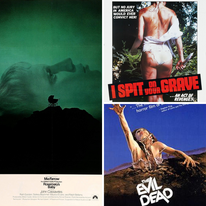TW: This article discusses depictions of sexual assault and violence in film.
For better or for worse, the horror movie genre is rife with depictions of sexual violence.
Where do I even start?
There are the explicit rape scenes, prolonged and intensely violent, like you’d find in Rape and Revenge horror such as I Spit on Your Grave or The Last House on the Left. Explicit depictions of sexual violence aren’t exclusive to the Rape and Revenge subgenre, though; you can find rape scenes in everything from Rosemary’s Baby to Evil Dead.
Beyond that, there is the threat of sexual violence, often coming in the form of unwanted sexual attention from monsters, aliens, and other inhuman creatures.
Then, of course, there are the scenes that aren’t technically sexual violence but are absolutely meant to feel like they are—the old slasher trope of brutally killing beautiful naked women after (or in the middle of) sex certainly comes to mind.
Does sexual violence have a place in the horror genre? I’d say it does. Sexual violence is, of course, horrific. At the end of the day, the horror genre is about what scares us, and the fear of sexual violence is an all-too-common part of the human experience, particularly for women. To say that sexual violence should never be shown or talked about in horror feels like a big mistake.
However, I’d say it’s far too easy for the horror genre’s depictions of sexual violence to fall into the realm of exploitation.
Too often, scenes of sexual violence in horror feel “thrown in” simply with the intent to shock or, even worse, to titillate. Very rarely do these movies seem particularly concerned with examining the aftermath of sexual violence—beyond, of course, the survivor going on a bloody revenge mission or being turned into a figurative (or literal) monster as a result of their assault.
In theory, many horror filmmakers include sexual violence because it’s horrible, but they clearly aren’t concerned with examining the weight or true horror of it. Which brings us back to titillation.
One of the biggest problems I see in the depiction of rape on screen—regardless of genre—is when rape scenes are filmed like sex scenes, with the intent to excite and arouse the audience.
Here’s the thing: every time you watch a movie, you’re being manipulated by the filmmakers. I don’t even mean this in a particularly insidious way; it’s just the truth. Everything is done on purpose. Everything that’s included in a shot, what they choose to show and not to show, the way they choose to show it: all of this is done to coax the viewer into different responses.
If a rape scene is shot like a sex scene, this is done on purpose. It’s showing you what the filmmakers actually think about sexual assault.
The next time you come across a rape scene (especially one in a horror movie), ask yourself: what is the camera focusing on? What are they choosing to show us? If you’re watching a rape scene but the camera only really seems concerned with showing you how beautiful and naked the person being assaulted is, there’s a big problem.
Personally speaking: I hate rape scenes. I never want to see them. I think they’re gratuitous and very rarely treated with the gravity that they deserve. If I could go the rest of my life without stumbling upon another rape scene in movies or television, I would be incredibly happy.
But regardless of what I might personally want, it doesn’t seem like filmmakers are going to stop depicting sexual violence on screen any time soon.
If you’re including sexual violence in your horror movie because sexual violence is horrible and frightening, then for the love of God, make it horrible and frightening. Presenting the audience with sexualized, titillating depictions of sexual violence only serves to further perpetuate rape culture. Additionally, if you’re going include sexual violence, give it the weight it deserves. You’re doing survivors a disservice by including it only to swipe the aftermath under the rug.
Monsters might not be real, but sexual violence very much is.

Laura Browne
Hi, I’m Laura! I’m a 24 year old artist, performer, and educator from Westchester, New York. I joined Survivors to Superheroes because I believe we need to get rid of the stigma surrounding talking about sexual violence. I want survivors to feel supported and heard. With my articles, I hope to open the door to honest conversations about sexual violence in the world around us. Beyond my work with Survivors to Superheroes, I love to bake, draw, and write comedy!




